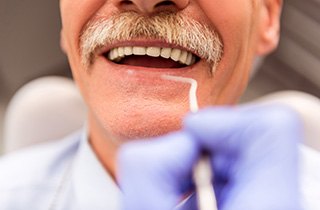Emergency Dentist DFW
Toothache pain, facial trauma, sports injuries – they can all lead to stressful, anxiety-inducing dental emergencies. If you break your arm, you know who to call and where to go for help, but some patients don’t have the same luxury when it comes to dental emergencies. A trip to the emergency room may not be the best solution for urgent dental issues. Instead, many patients put off treatment until their dentist is open on Monday morning, even if they experience dental trauma on Friday night. At Bear Creek Family Dentistry, we’re here to help whenever our patients need us, and that includes offering same-day emergency dentistry appointments. With numerous DFW Metroplex locations, there’s a dental office near you whenever you need our help. Call right away if you or a loved one need dental care, and we’ll do our utmost to see you on the same day you get in touch with our team. Our goal is to provide treatment to eliminate pain immediately. Then, we’ll partner with you to create a long-term plan to fully renew your oral health.
Why Choose Bear Creek Family Dentistry for Emergency Dentistry?
- Same-Day Emergency Appointments Available
- Children and Adults Welcome
- Knowledgeable Dental Experts and Caring Staff
How We Treat Dental Emergencies

- Schedule an Emergency Appointment: Step one is to schedule an emergency dental visit. We’ll try to see you on the same day as your call whenever we can. Be sure to follow any first-aid tips that our team gives you.
- Perform an Emergency Exam: We’ll examine your teeth and gums, and we’ll take X-rays if we have to. Our goal with an emergency exam is simple: to figure out how extensive the problem is and what’s causing it.
- Review Our Findings: We will share the results of our examination with you. Then we will explain what treatment options are available, how much they cost, and how long they can be expected to take.
- Give Your Smile the Care It Needs: Once a treatment plan has been agreed upon, we can proceed with taking whatever steps are needed to resolve your dental emergency. This can involve dental crown placement, extractions for badly damaged teeth, and other dental services.
The Most Common Dental Emergencies
If you believe your dental situation requires urgent care, call our team at Bear Creek Family Dentistry. We’re ready to treat a wide variety of dental emergencies, whether they’re the result of a sudden accident or an oral health issue that was ignored for too long. Below are examples of some of the most common emergencies that we can help with.
Understanding the Cost of Dental Emergencies

Since no two dental emergencies are alike, the amount that you pay for treatment won’t always be the same. To create a reliable estimate, we will need to first take into account factors such as how severe your emergency is as well as what kind of services are required to stop your pain and/or fix the damage. If you have dental insurance, we can help you figure out the best way to utilize your benefits in order to save money on your care.
Keys to Preventing Dental Emergencies

Although some urgent oral issues occur due to circumstances beyond your control, many common problems that contribute to emergencies can thankfully be avoided. Maintaining your dental health consistently strengthens your teeth and gums, so you’re less likely to experience damage, disease, or decay.
Continue reading to learn more about how you and your family can proactively protect your smiles with proper preventive care, and feel free to contact us with any additional questions.
Visit Your Dentist Regularly

One simple and effective way to keep oral issues at bay is by visiting our team every six months for a routine checkup and cleaning. This allows our team to monitor your condition to catch and treat any areas of concern, like thinning enamel or swollen gums, before they can progress.
If you’re concerned you can’t afford basic services, remember that it’s less expensive to invest in regular maintenance than to pay for more complex treatments required to address problems that have already worsened.
Implement an At-Home Hygiene Routine

Although visiting our team consistently helps protect your grin, you must also remove plaque and bacteria daily to avoid developing cavities or gum disease. You should gently scrub your enamel with a toothbrush of your choice and toothpaste for two minutes.
This removes germs and residue from the surface of your teeth, but it isn’t enough to prevent problems by itself. You must also clean between your teeth by carefully flossing, then rinse with a non-alcoholic mouthwash.
Eat a Wholesome Diet

Sugary foods attract bacteria that contribute to oral issues, and eating overly acidic foods can erode your enamel. To keep your smile in good condition, it’s best to limit your consumption of overly sweet, salty, and highly processed foods that offer little to no nutritional value.
You can improve your oral health by consuming a well-balanced diet that provides your body with all the necessary nutrients to function at its peak. That includes dairy, which contains calcium for strong teeth and bones. You should also eat citrus fruits with vitamin C to support your connective tissues.
Safeguard Your Smile

Athletes or others who participate in close-contact sports or activities are prone to injuries that can hurt their teeth. Fortunately, our Bear Creek Family Dentistry team can provide custom-fitted mouthguards to shield your grin from the force of potential physical trauma.
If you suffer from bruxism, or chronic teeth grinding, we can also provide nightguards to create a layer of cushion between your upper and lower arches. This protects your enamel from the added tension of constantly clenching, which also gives your jaw a break to relax and heal.
Don’t Use Your Teeth as Tools

If you’ve ever felt tempted to bite and tear open an envelope or plastic packaging, you’re not alone. Unfortunately, many patients have inadvertently injured their teeth or the tender tissues in their mouth by using them as tools.
It’s safer to take a few moments to locate the appropriate instrument for the job, like a pair of scissors, a box cutter, or a letter opener.
Dental Emergency FAQs
Can the Emergency Room Remove a Tooth?
No, the emergency room cannot remove a tooth because only licensed dentists are legally allowed to perform extractions. If you visit the ER with a severe toothache, they can provide antibiotics and pain medication to manage symptoms – but this won’t resolve the underlying issue. A tooth extraction might not even be necessary! Your dentist may recommend another treatment (i.e., root canal) instead. To determine the best solution, be sure to schedule an emergency appointment with your dentist so they can properly diagnose and address the problem.
What Does Throbbing Tooth Pain Mean?
It often indicates an infection or inflammation inside the tooth. Cavities or cracks can expose the sensitive inner pulp to air and bacteria, leading to irritation, nerve pain, and possible infection. Decay can also contribute to this discomfort. In some cases, chronic teeth grinding or clenching may be the cause. If you experience persistent throbbing pain, it’s important to see a dentist as soon as possible to determine the underlying issue and receive the appropriate treatment.
Can Superglue Be Used to Repair Broken Dentures?
Absolutely not! The chemicals in superglue can be toxic and may cause allergic reactions. It can also alter the taste of food, making eating unpleasant. Additionally, superglue is not durable in damp environments like the mouth, meaning the repair won’t last long. For a safe and effective fix, it’s best to visit a dentist or a professional who can properly repair or replace the dentures.
What Does Chronic Bad Breath Mean?
Also known as halitosis, chronic bad breath is more than just morning breath or odors from certain foods. It often signals an underlying issue that mints or brushing alone cannot fix. Common causes include smoking, tobacco use, cavities, gum disease, or dental infections. If bad breath persists for more than a few days, it’s important to see a dentist to rule out any serious oral health problems. Addressing the root cause is essential for long-term freshness and overall dental health.
Can I Pop a Dental Abscess on My Own?
You should never attempt to pop a dental abscess on your own. It’s a serious infection that requires immediate attention from a dentist. Trying to pop it can introduce more bacteria into your mouth, worsen the infection, and increase irritation. Delaying professional treatment can also allow the infection to spread beyond the mouth to the neck, throat, or even the head, leading to severe complications. If you suspect an abscess, contact a dentist immediately for proper care.
